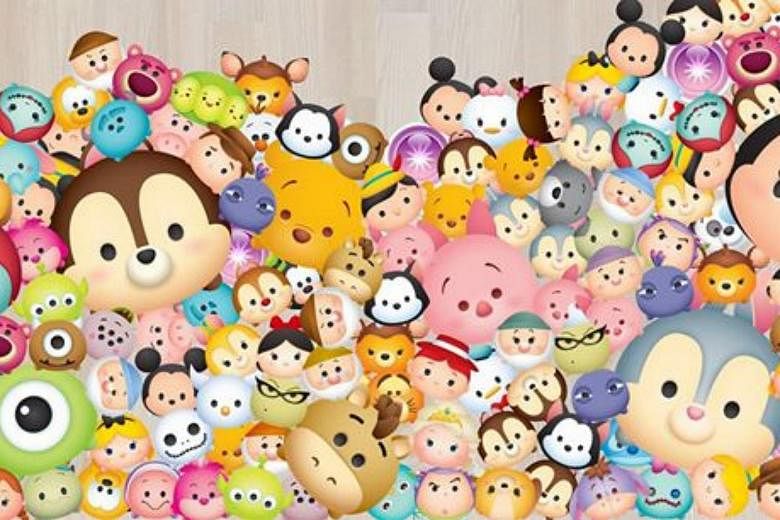It all began a few months ago, after lunch at a food court near the office.
"You have to try it," my colleague told me, passing me her phone.
"It" was a simple Disney mobile game, Tsum Tsum (pronounced "soom soom", which means "stack stack" in Japanese, the game's place of origin).
And since then, I have been hooked.
For me, Tsum Tsum has become much more than just a mobile game. It has become a means of communication, a way to make new friends and a source of friendly (or sometimes not-so-friendly) rivalry with people I have known for years, as well as people I have never met.
It is not a particularly strategic game. All you have to do is to connect at least three Tsums, which are round cartoon versions of Disney characters such as Mickey Mouse and Frozen's Elsa, by tracing a line with your finger. Once the chain completes, the Tsums will explode in a shower of in-game coins and points.
Neither is it a particularly well- designed app. Tsum Tsum suffers from an overly fussy, laggy user interface and the annoying pre- requisite of having to be connected to the Internet in order to play.
But what has made it such an integral part of my daily routine now is the social element of the game.
This has been the case for many mobile apps, as developers have realised that creating a community around a game is key to lengthening its lifespan.
Gone are the days of classical mobile phone games such as Snake and Tetris, where each player battled in a bubble and high scores lived only in his phone.
Now, many popular mobile games such as Clash Of Clans or Candy Crush have leaderboards where you can see how you stack up against your friends or mechanics where having more active friends gives you an in-game advantage.
An important part of Tsum Tsum is making friends, as they can send each other in-game lives and currency, which greatly accelerates progress.
The home page of the app also doubles as the game's leaderboard, where almost 350 of my colleagues, friends and people I have met online are ranked from top to bottom.
To facilitate these social aspects, Tsum Tsum is linked to messaging app Line, where you can add people and chat with them outside of the game.
All this has resulted in a strong community sprouting up around this simple game.
I am part of at least three Line groups for players to meet other players and I was invited to join them by people I have never met face-to-face.
Since then, I have chatted to these once-strangers about my pet Japanese spitz, seen pictures of their kids and families, and heard post mortems of their dates.
Even in the office, I have made friends with people through Tsum Tsum I would otherwise have never met. One of them even bought tiny Tsum plushies for his Tsum-crazy colleagues while he was on holiday in Japan, where the game was first released.
But while the social element of the game is largely casual and friendly, there is more to it than that.
Because the game ranks me against people I know, this has sparked my fierce drive to compete. A few days after downloading Tsum Tsum, I had clawed my way up the ranks. I spent hours mindlessly connecting Tsums on the bus, while watching television or before sleeping at night.
In the hours before the weekly leaderboard reset on Sunday night, I would be feverishly chalking up points, to make sure I maintain my ranking.
This would probably not be the case without a leaderboard. Offline, high scores exist in a vacuum, but once it is on display for friends and colleagues to see, it becomes a silly matter of pride.
I know for a fact that I am not the only Tsum-addict in the office. Some of my colleagues do the same as well and, for a while, lunchtime conversations revolved around strategies and methods to hit the next high score.
But while the competition and rivalry are friendly, the social element of Tsum comes with a darker side as well.
Because of the nature of the app - it is linked to messaging client Line - you can talk to people around the world, sometimes with nasty consequences.
One of the groups I am in numbers around 70 people, mostly Americans, all of whom met each other through the game. Most of the time, the chat conversation revolves around Tsum Tsum or day-to-day topics, such as work and family.
But one day, someone invited a new member to the group. This player, a fellow Singaporean who is now living overseas, would make disparaging remarks about Singapore and derail simple daily conversations with long, incomprehensible rants about topics such as the state of Greece's economy, steadfastly ignoring anyone who tried to rein him in.
These interruptions irked my colleague, who was also in the group, to the point that he told him in no uncertain terms to pipe down.
The other player responded angrily and this quickly escalated into dramatic verbal fisticuffs over the group chat, which led to my colleague being ceremoniously booted from the group.
Such exchanges may sound small; after all, these are strangers, and the other player is a faceless person you will never meet.
But such interactions would never have happened in the past, before mobile gaming turned social.
From a developer's point of view, adding a social element to an app is great, if you can establish a firm following of players. By building a community and getting people involved, players will become more invested in the game and perhaps less inclined to switch to another app.
But for newer mobile games, it may be hard to wrangle a piece of the market from juggernauts such as Tsum Tsum, which already have a firmly established community.
From a user's point of view, the social aspect of mobile gaming is definitely a plus point.
It lets me interact with people from all over the world and it is also something I share with some of the people around me.
But there are times when I am tired of it, when I do not feel like reading the group chat or when sending my friends in-game lives and coins feels like a chore.
At times like these, give me a dose of good old-fashioned Snake any day.


